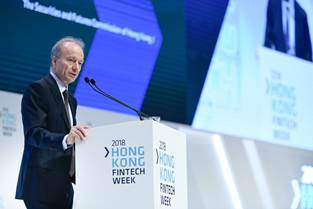
What Hong Kong’s Regulator Has to Say About Their New Cryptocurrency Regulation
by Fintech News Hong Kong November 5, 2018When you bring up blockchain with enthusiasts nowadays, the tone of conversations usually involves them making excuses for cryptocurrency, and a plea to not let that stain your impression of the underlying blockchain technology.
This is a marked shift in mindset from just one year ago, when there were excited whispers about cryptocurrency potentially replacing fiat currencies altogether.
The global obsession with cryptocurrencies have cooled somewhat, but Hong Kong still serves as a hotbed of activity and seen as one of the world’s premier trading regions—particularly so once the mainland decreed cryptocurrency as illegal.
Hong Kong is also the home of well-known cryptocurrency exchanges like OKEx and BitMEX.
This was perhaps why Hong Kong raised $223 million in proceeds across 20 closed ICOs with 15 more in the pipeline as of last June. While it trails behind Singapore, Hong Kong is considered one of the bedrocks of cryptocurrency and ICO in Asia.
So SFC Looks to Encourage That China Cash
Fast forward to today, and in line with Carlson’s statement as the ex-chairman of the Securities and Futures Commission of Hong Kong (SFC), the regulations are mainly considered to protect investors, and perhaps help curate the ecosystem and moving developments to one that the authority approves of.
This decision did not come lightly for Hong Kong. Just a few weeks ago, the outgoing chairman described investor protection as the key reason behind the authority’s move to regulate.
But to do so, the SFC had to first get the Hong Kong government to recognise the asset as a security—one of the big loopholes that prevented effective regulation before.
“It will boost investor protection and hence attract more mainlanders to trade cryptocurrency assets in Hong Kong,” said Gary Cheung, chairman of Hong Kong Securities Association. “This will help Hong Kong to be among the top cryptocurrency trading centres worldwide because proper regulation is very important for attracting the big players.”
Three of the most important developments are:
- Only professional investors should be allowed to participate in the scene for the time being, acording to SFC
- Fund managers that invest more than 10% of their assets in virtual currencies will need a license by the SFC
- Trading platforms for professional investors can join a sandbox subject to anti-money laundering, and other laws
Securities Watchdogs Across The Globe Decree Cryptocurrency Not A Threat—Yet

Ashley Alder
In a talk at the Hong Kong Fintech Week 2018, Ashley Adler, CEO of the Securities and Futures Commision, revealed that the potential conduct and market integrity risks of crypto-assets, or virtual assets, are now one of IOSCO’s top priorities.
IOSCO here refers to The International Organisation of Securities Commissions, a collection of different securities watchdogs across the globe that bands together to develop, implement and promote benchmark standards for regulation.
And the association, according to Ashley, makes this verdict based on “a report by the Financial Stability Board (FSB) this summer concluded that, despite some concerns, virtual assets, and platforms used to trade them did not—as yet—pose a threat to global economic or financial stability”.
This perhaps hints that any regulations announced now are subject to changes along the way as cryptocurrency moves forward, especially if more people begin to use it.
The same reasoning is perhaps why recently, another member country of the IOSCO, Malaysia, announced that they are looking into potential regulations as well.
Regulations Will be Focused on Two Key Tenants: The Assets and The Platforms of Exchange
The first, as described by Ashley, are virtual assets. In his talk, Ashley specifically described virtual asset portfolio and management and distribution, where those who intend on investing more than 10% of a mixed portfolio in virtual assets will need to observe new requirements targeting crypto-assets, no matter if they count as securities or futures contracts.
“However, I should be clear that our reach will still not extend to managers of pure crypto funds.”
As such, the SFC aims to fill the gap with further regulation of fund distributions as long as it has crypto-exposure, by imposing expected standards when firms distribute virtual asset funds.
Things become a tad tricky when there is an attempt to regulate crypto exchanges.
“We are not yet sure that virtual asset trading platforms are in fact suitable for regulation. They are technically, structurally and qualitatively different from traditional stock and futures exchanges. Our aim here is to explore how they might be regulated and then form a more
definitive view after this exploratory stage,” said Ashley.
This was the reasoning behind the opt-in crypto-sandbox introduced. No formal regulatory approval will be given to an oprator yet, but the regulator will be closely monitoring the operations of the platform to best figure out standards for regulation.
The hope is that investors will still benefit if they can observe platforms that want to be supervised by SFC are set apart from the others in the market.
Fintech News is still concerned that the authority might decide to axe cryptocurrency exchanges altogether though, as according to Ashley, “we are unsure at this stage whether platforms can satisfy our expected anti-money laundering standards”.
“This is because anonymity is a core feature of blockchain, which is the underlying technology for virtual assets. We also need to be alive to the rapid evolution of the whole crypto industry as well as developments in the international regulatory community, including the work being done in IOSCO.”
“We Do Not Have a Lot of Options Here,” Said Ashley
“We could rely on an interpretation of our remit as a narrow one, view the whole crypto world as unregulated and rely on investor education to warn the public of the risks. But maintaining the status quo may not be an option if in reality investors are left unprotected as crypto activities thrive.”
“As such, we recently decided to step up as much as we are able to protect investors who trade virtual assets.”
It seems like the future is still not set in stone for cryptocurrency in Hong Kong and the general IOSCO, but observers of the space can begin to see how the scene might be moving and at the very least, what the regulators’ goals are.








